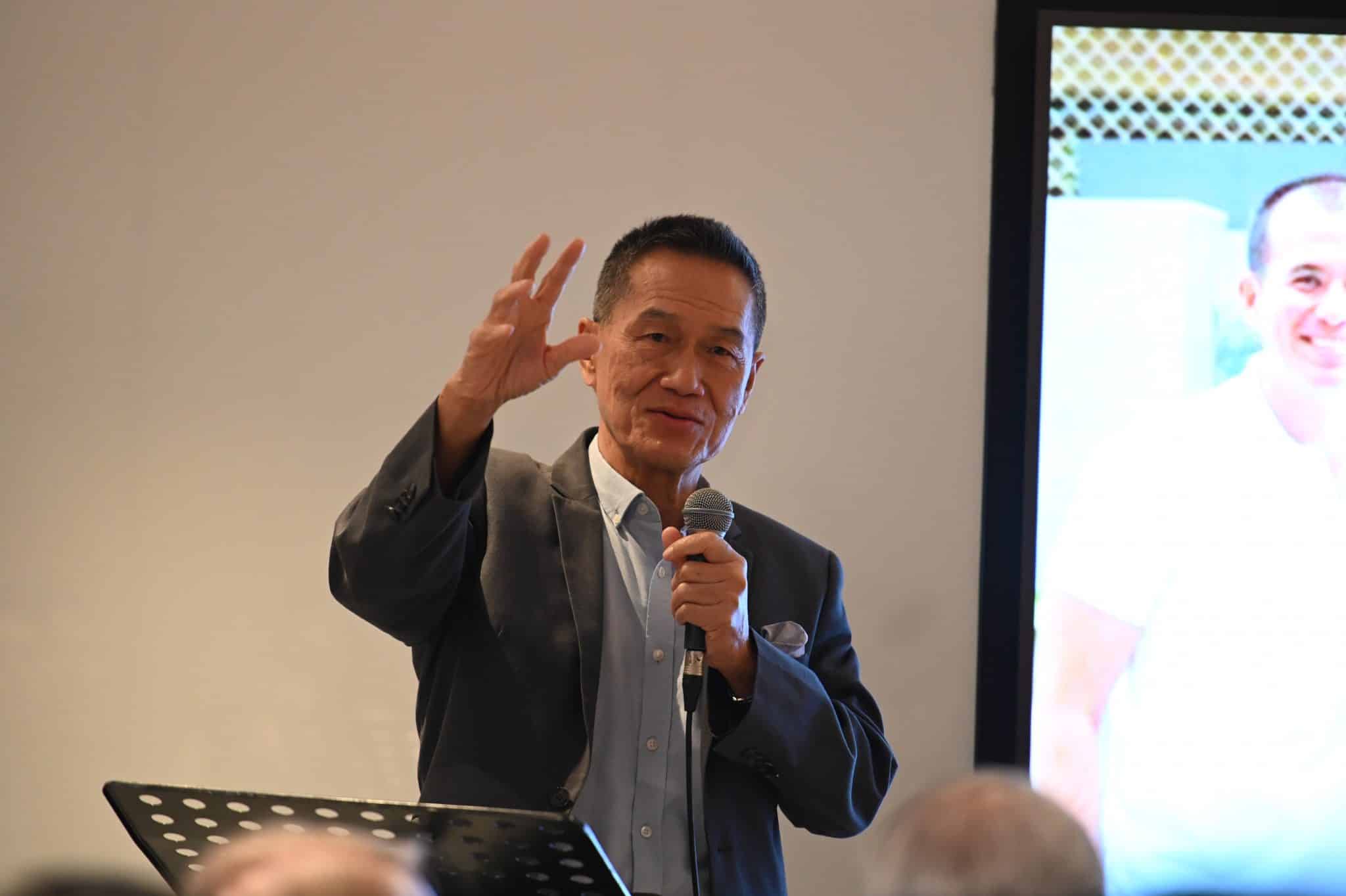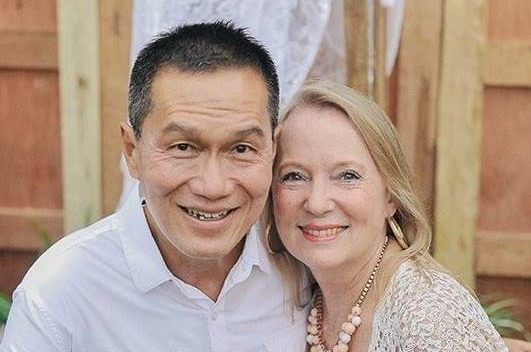“If you do not have their hearts, you will not have their minds”: Rev Dr Peter Tan-Chi on how to disciple our children well
Joanna Ong // October 11, 2023, 11:38 am

“Who is supposed to disciple our children? Not the school, not even the church, not even the youth pastor. It's the parents," said Rev Peter Tan-Chi at this year's Eagles Leadership Conference (ELC). All photos courtesy of ELC.
“Families are really foundational. If the family goes, so does the nation. And I will say, if the family goes, so does the Church.”
This is why it is so important for us to build strong families, said Rev Dr Peter Tan-Chi, founder and senior pastor of Christ’s Commission Fellowship in the Philippines, at this year’s Eagle’s Leadership Convention. The biennial leadership forum was held in Singapore from July 20 to 22.
Rev Tan-Chi shared the stage with Jason Wong, founder of the Yellow Ribbon Project and Dads for Life movement, as they spoke more about the value of families and how we can shape and disciple our children’s hearts.
Three key relationships
Drawing from Genesis 1:27-28, Wong began by laying out three key relationships that God designed us to have:
- A God-man relationship – “God created man in his own image” (Genesis 1:27a)
- A husband-wife relationship – “male and female he created them” (Genesis 1:27c)
- Parent-children relationships – “be fruitful and multiply (Genesis 1:28)
He then further simplified these God-intended relationships into three streams: upstream (God-man relationship), midstream (husband-wife relationship) and downstream (parent-child relationship).
All relationships start upstream.
“If you want to restore a broken relationship with your child (downstream), work on your relationship first with God (upstream) and your relationship with your spouse (midstream). The likelihood is that everything else will fall into place,” said Wong.
The importance of fathers
An advocate for fathering, Wong also stressed the importance of fathers’ involvement in their children’s upbringing.
“If fathers are involved, there will be less need for prisons and police officers.”
Research has found that children perform better cognitively, socially, emotionally and mentally, as well as display lower at-risk behaviours, when their fathers are involved in their lives, he noted.
Recalling his 17-year career as a prison officer, Wong concluded from his conversations with the inmates that he must never outsource his fathering role. “If fathers are involved, there will be less need for prisons and police officers,” he said.
He likened the role of mothers and fathers to sunlight and water in the growth of a plant. For a plant to grow well, we cannot substitute sunlight with more water. Neither can we substitute water with more sunlight.

Jason Wong stressed the importance of a father’s role in a child’s life.
Similarly, a child needs the presence of both father and mother, he said. For example, mothers play a more protective role while fathers typically have a higher risk appetite that helps to prepare the child for the future.
“That’s why God created man and woman, husband and wife, mother and father, because the child needs both,” he said.
Principles to influence the heart
When both parents are actively involved in their children’s life, that sets the foundation for nurturing the little ones in the ways of the Lord.
Parents usually focus on external behaviours but neglect connecting with the child’s heart.
“Who is supposed to disciple our children? Not the school, not even the church, not even the youth pastor. It’s the parents,” said Rev Tan-Chi.
Pointing to Judges 2:6-11, he highlighted how Joshua’s generation and the generation after that served the Lord, but the third generation “knew neither the Lord nor what he had done for Israel” (Judges 2:10).
“If you’re not careful, you will pass on a religion, not a relationship with the real Saviour, Jesus Christ,” he warned.
How then should we disciple our children?
For any lasting change to happen, we need to focus on the heart, he said. The heart is the root and behaviour is the fruit. Lasting change will only take place when the heart is transformed. Parents usually focus on external behaviours but neglect connecting with the child’s heart.
Using the acronym MRI, Rev Tan-Chi shared three biblical principles on how we can influence our children’s hearts.
These pointers were taken from his book Motivate, which he co-authored with his wife of 50 years, Deonna. The book is a culmination of their insights into parenting after raising five children, by whom they now have 21 grandchildren.
M – Model godly behaviour
It is important to model godly behaviour because our children will always copy us, said Rev Tan-Chi. “My wife coined this phrase: You must be what you want your children to be, because they will become what you are.”
He highlighted some areas that parents can intentionally model Christ-like behaviour:
- Gentleness and respect for wife
- Respect for authority
- How you face criticism with humility
- How you handle stressful situations
- How you spend money
- How you speak to one another
- What to do in your free time
- How you love and worship the Lord
- How you apologise and ask for forgiveness
We need to be controlled by the Holy Spirit, he said, because even if we think our children are not watching us or noticing our behaviour, they are.
“You must be what you want your children to be, because they will become what you are.”
However, he clarified that modelling is not about perfection. “I make mistakes, my wife makes mistakes. But … we admit it, we say, ‘Forgive us’,” he said. “Modelling is about authenticity … Modelling requires perseverance.”
Rev Tan-Chi shared a video of one of his adult daughters, Joy Tan-Chi Mendoza, speaking about how her parents have been her role models.
“I would see them up on the pulpit, especially my father. When he preached, I really believed in what he said, not just because it was from the Word of God, but because I saw that he lived the things that he talked about at home consistently. That really blessed me,” she said.
Joy also gave examples of how her mother modelled patience in daily parenting and submission to her father.
“I don’t ever remember my mom yelling or getting really irritated with us. There have been times that I’ve struggled with my own children. I remember my mom’s example, because I want my children to remember the same thing about me, that I choose to be a happy person because of the Lord,” she said.
“My mom also role-modelled what it really means to be a submissive wife, one who honours her husband. And I have that in mind when I’m relating to my own husband.”
R – Relationships are important
For modelling to be effective, there must be a close parent-child relationship.
“The closer the relationship, the greater the influence,” said Rev Tan-Chi, noting that a biological relationship does not guarantee a good relationship.
Let’s have the attitude of ‘Nothing to prove, everything to improve’.
“Rules without relationship leads to rebellion. Discipline without relationship leads to resentment. Teaching values without relationship leads to rejection. That’s why relationship is crucial,” he stressed.
“Ask yourself, is your child in love with you? If you do not have their hearts, you will not have their minds,” he said.
Rev Tan-Chi added that many things these days are vying for the heart of our children. If they do not feel accepted by their parents, they will seek other sources for approval. However, if they have a close relationship with their parents, they will be less influenced by others.
In a video, one of Rev Tan-Chi’s adult sons shared: “If you want to develop intimate relationships with your children, just want to be with them. That’s how I felt like growing up. I knew my parents wanted to be with me. They said that constantly.”
Addressing parents who want to restore their relationship with older children, Rev Tan-Chi encouraged them to ask their children three important questions:
- I want to be a better father/mother. How can I improve?
- How have I hurt you?
- I am sorry. Will you forgive me?
Most importantly, listen, he said. If they refuse to talk, don’t force them. Be patient. Look at them with eyes of humility. Listen and don’t defend. Don’t lecture. Don’t explain. Just listen. Seek forgiveness and reconciliation.
“We do that with our family every year and there’ll be crying. Even after 50 years of marriage, my wife still thinks I can improve. It’s surprising but that’s the truth,” Rev Tan-Chi said with a laugh.
Let’s have the attitude of ‘Nothing to prove, everything to improve’, he added.
I – Intentionality is key
Besides being intentional in building relationships with our children, be intentional in shaping their desires. “Good results seldom happen by chance,” said Rev Tan-Chi.
We need to teach our children not to blindly copy the crowd. Instead, we need to train them to listen to God’s Word.
He pointed to Proverbs 22:6, which says: “Train up a child in the way he should go; even when he is old he will not depart from it.” In Hebrew, the word “train” is “chanak”, which is used in two scenarios.
The first is training a wild horse. Until you break the will – not the spirit – of the wild horse, it is totally useless. Our children have untamed wills that need to be broken, said Rev Tan-Chi.
“Chanak” is also used to describe how a midwife puts a forefinger into a newborn baby’s mouth to teach him to suckle milk.
“I realised that’s parenting. You train your children by directing them, creating the right desire to pursue God, love God, read the Bible,” he said.
The right approach is training, not lecturing. Lecturing involves only talking, while training is teaching them to do something until it becomes a habit or second nature.
“Training deals with the heart and involves practice,” he said.
One thing that parents can train their children to do is to think critically, said Rev Tan-Chi, adding that the first 12 years are particularly crucial.
We need to teach our children not to blindly copy the crowd and listen to the voice of the world. Just because everyone is doing it, doesn’t mean it’s right.
Instead, we need to train them to listen to God’s Word:
- The world says, Do whatever that makes you happy. The Bible says, Be holy, deny yourselves.
- The world preaches, YOLO (you only live once). The Bible says, There’s life after death.
- The world sings, Follow your heart. The Bible says, The heart is deceitful. Follow Jesus.
Acknowledging that parenting is no easy task, Rev Tan-Chi encouraged all parents to trust that the Lord is with them in this challenging journey.
He said: “It’s all about God. Use the Bible. Pray for God’s spirit to fill all of our children’s lives.”
RELATED STORIES:
We are an independent, non-profit organisation that relies on the generosity of our readers, such as yourself, to continue serving the kingdom. Every dollar donated goes directly back into our editorial coverage.
Would you consider partnering with us in our kingdom work by supporting us financially, either as a one-off donation, or a recurring pledge?
Support Salt&Light




